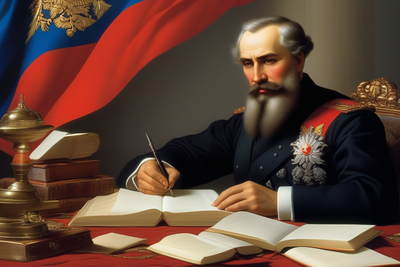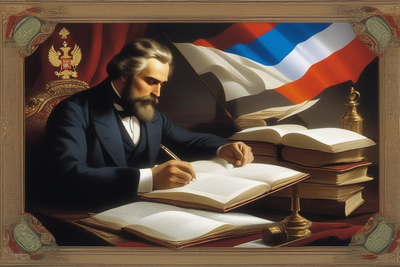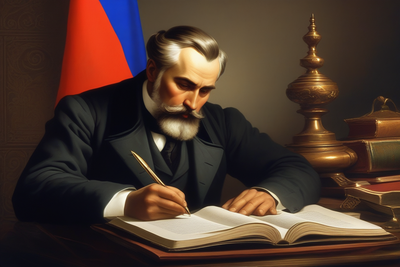russian literature
Exploring Life's Depths BY TEGEDAO - Where Russian Literature Meets the Human Spirit



Classical Russian literature holds a unique and esteemed place in the world of letters, distinguished by its profound exploration of the human soul and spirit. This article delves into the characteristics that set apart Russian literature, particularly during its classical period, and examines how it probes the depths of human experience in a deeply spiritual manner.
The Russian literary tradition is renowned for its introspective depth, emotional intensity, and philosophical breadth. At the heart of this tradition is an unflinching inquiry into the human condition. Authors such as Leo Tolstoy, Fyodor Dostoevsky, Anton Chekhov, and Nikolai Gogol have created works that transcend mere storytelling to become explorations of the human psyche.
Philosophical Depth: Russian classics often grapple with fundamental questions of existence, morality, and faith. Dostoevsky's "Brothers Karamazov" and Tolstoy's "War and Peace" are prime examples of novels that explore philosophical and ethical dilemmas, forcing readers to confront the complexities of life, good and evil, and the nature of the human spirit.
Psychological Insight: The psychological realism in Russian literature is striking. Characters are not just figures in a plot but are deeply complex individuals with inner lives as tumultuous and intricate as reality itself. This is evident in the conflicted souls of characters like Raskolnikov in "Crime and Punishment" or Ivan Ilyich in Tolstoy's "The Death of Ivan Ilyich".
Social and Moral Critique: These works often serve as critiques of society and human nature. Gogol's "Dead Souls" and Chekhov's short stories, for instance, offer incisive critiques of Russian society, revealing the moral and spiritual crises of their times.
Spiritual and Mystical Elements: There is a certain mysticism in Russian literature. It often delves into the spiritual, exploring the unseen forces that shape human destiny and the search for meaning beyond the material world.
Emotional Depth: The raw and often turbulent emotional landscape of Russian literature is unparalleled. The profound sense of tragedy, love, loss, and redemption that permeates these works speaks to the very core of what it means to be human.
The legacy of classical Russian literature is vast. Its influence can be seen in the works of countless writers across the globe. Its deep examination of the human soul and the moral and ethical questions of life continues to resonate with readers and scholars alike. The depth and intensity with which Russian authors have explored the human condition have made their works timeless, continuing to offer insights and reflections relevant to each new generation.
In conclusion, classical Russian literature uniquely enters the human soul through its combination of philosophical depth, psychological insight, social and moral critique, spiritual exploration, and emotional intensity. These elements, woven together, create a tapestry of human experience that is as rich and complex as life itself. The works of Russian literary giants continue to enlighten, challenge, and inspire readers around the world, affirming the enduring power and relevance of their explorations into the human spirit.
--
Classic Russian literature is awe-inspiring for its profound psychological depth and emotional intensity, offering unparalleled insights into the human condition. Its masterful storytelling intertwines complex characters, philosophical inquiries, and moral dilemmas, revealing the soul's deepest layers. The works of authors like Tolstoy and Dostoevsky transcend time, captivating readers with their exploration of existential themes, societal critiques, and spiritual quests. This literature is a testament to the enduring power of the written word to reflect and shape our understanding of life, love, and humanity itself.
Russian literature, renowned for its depth and intensity, has long stood at the crossroads of the mystic and the real, weaving intricate tapestries of spiritual exploration within the fabric of tangible human experiences.
What distinguishes Russian literature is how it seamlessly blends the mystical with the real. The characters are often caught in the tumult of their inner spiritual journeys, while navigating the tangible challenges of their social and political realities. This blend is not just a narrative device but a reflection of the Russian worldview, where the spiritual and the material are in constant dialogue.
(this text is generated by Chat GPT)
The Russian literary tradition is renowned for its introspective depth, emotional intensity, and philosophical breadth. At the heart of this tradition is an unflinching inquiry into the human condition. Authors such as Leo Tolstoy, Fyodor Dostoevsky, Anton Chekhov, and Nikolai Gogol have created works that transcend mere storytelling to become explorations of the human psyche.
Philosophical Depth: Russian classics often grapple with fundamental questions of existence, morality, and faith. Dostoevsky's "Brothers Karamazov" and Tolstoy's "War and Peace" are prime examples of novels that explore philosophical and ethical dilemmas, forcing readers to confront the complexities of life, good and evil, and the nature of the human spirit.
Psychological Insight: The psychological realism in Russian literature is striking. Characters are not just figures in a plot but are deeply complex individuals with inner lives as tumultuous and intricate as reality itself. This is evident in the conflicted souls of characters like Raskolnikov in "Crime and Punishment" or Ivan Ilyich in Tolstoy's "The Death of Ivan Ilyich".
Social and Moral Critique: These works often serve as critiques of society and human nature. Gogol's "Dead Souls" and Chekhov's short stories, for instance, offer incisive critiques of Russian society, revealing the moral and spiritual crises of their times.
Spiritual and Mystical Elements: There is a certain mysticism in Russian literature. It often delves into the spiritual, exploring the unseen forces that shape human destiny and the search for meaning beyond the material world.
Emotional Depth: The raw and often turbulent emotional landscape of Russian literature is unparalleled. The profound sense of tragedy, love, loss, and redemption that permeates these works speaks to the very core of what it means to be human.
The legacy of classical Russian literature is vast. Its influence can be seen in the works of countless writers across the globe. Its deep examination of the human soul and the moral and ethical questions of life continues to resonate with readers and scholars alike. The depth and intensity with which Russian authors have explored the human condition have made their works timeless, continuing to offer insights and reflections relevant to each new generation.
In conclusion, classical Russian literature uniquely enters the human soul through its combination of philosophical depth, psychological insight, social and moral critique, spiritual exploration, and emotional intensity. These elements, woven together, create a tapestry of human experience that is as rich and complex as life itself. The works of Russian literary giants continue to enlighten, challenge, and inspire readers around the world, affirming the enduring power and relevance of their explorations into the human spirit.
--
Classic Russian literature is awe-inspiring for its profound psychological depth and emotional intensity, offering unparalleled insights into the human condition. Its masterful storytelling intertwines complex characters, philosophical inquiries, and moral dilemmas, revealing the soul's deepest layers. The works of authors like Tolstoy and Dostoevsky transcend time, captivating readers with their exploration of existential themes, societal critiques, and spiritual quests. This literature is a testament to the enduring power of the written word to reflect and shape our understanding of life, love, and humanity itself.
Russian literature, renowned for its depth and intensity, has long stood at the crossroads of the mystic and the real, weaving intricate tapestries of spiritual exploration within the fabric of tangible human experiences.
What distinguishes Russian literature is how it seamlessly blends the mystical with the real. The characters are often caught in the tumult of their inner spiritual journeys, while navigating the tangible challenges of their social and political realities. This blend is not just a narrative device but a reflection of the Russian worldview, where the spiritual and the material are in constant dialogue.
- Redemption and Suffering: Russian literature frequently portrays suffering as a pathway to redemption, a concept deeply rooted in Orthodox Christian thought. Characters undergo profound personal crises that lead to spiritual awakening and moral redemption.
- The Existential Search for Meaning: Russian authors often pose existential questions about the purpose of life, the existence of God, and the nature of good and evil. This search for meaning extends beyond religious doctrine, delving into the essence of human consciousness and morality.
- The Conflict of Faith and Doubt: Doubt is as central to the spiritual journey in Russian literature as faith. Characters often struggle with their beliefs, facing moral dilemmas that challenge their spiritual convictions.
- Mysticism and the Supernatural: Elements of mysticism and the supernatural appear frequently, not as mere fantasy but as manifestations of the deeper realities of the human soul and its connection to the unknown.
(this text is generated by Chat GPT)